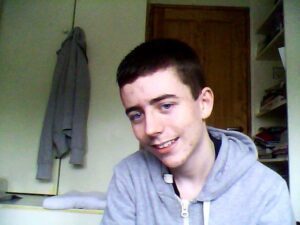 Jake’s mother, Stephanie, describes her son as a beautiful, bright 14-year old boy. In late 2011, he was diagnosed with Asperger’s syndrome in an extremely mild form (the diagnosis of Asperger’s was eliminated in 2013 in DSM-5 and replaced by a diagnosis of autism spectrum disorder).
Jake’s mother, Stephanie, describes her son as a beautiful, bright 14-year old boy. In late 2011, he was diagnosed with Asperger’s syndrome in an extremely mild form (the diagnosis of Asperger’s was eliminated in 2013 in DSM-5 and replaced by a diagnosis of autism spectrum disorder).
Jake started counselling with a psychologist in 2011 due to some dark thoughts that had appeared in an essay he wrote in school. In January 2013, he had counselling again, for anxiety, and his psychologist decided to refer him to her colleague, a psychiatrist, as she felt his anxiety would be heightened when he was to sit his state exams. Jake’s parents didn’t even know what a psychiatrist was but just thought it was the psychologist’s colleague.
Jake’s dad took him to his appointment because no big deal was made of it, and they met with the psychiatrist for ten minutes, after which they left with a prescription for fluoxetine. Jake had never been on medication before, but the family was not given any literature or any description from the psychiatrist or the pharmacist, and they didn’t even know what sort of drug Prozac was but simply trusted the psychiatrist.
Six days later, Jake had his first reaction. He walked out of an exam half-way through it and cried for about 2-3 hours that night, saying, “You don’t know what it’s like in my head.” His parents thought this was from the stress of the exams. They never imagined that a drug could do this to a person.
About a week later, they got Jake back to the psychiatrist and told her all about what happened, but she said that it would wear off after three or four weeks and that Jake would be fine. But Jake was not fine, and on day 46 he was a bit restless after school and looked a bit flush in the face, although he never had a colour in his cheeks. His parents thought he had a row with his little online girlfriend.
The family had a legally held rifle in the house, as Jake and Stephanie were members of a shooting club. They would often take the gun down, and Jake asked if he could take it down that night, which was nothing out of the ordinary, so his request was granted. Stephanie forgot to take the box from his room with bolt and ammunition.
Jake placed the gun in his mouth and pulled the trigger. He had no history of suicide ideation or self-harm, and no diagnosis of anything but Asperger’s. However, the National Health Service in Ireland is now trying to say he had severe anxiety – although this isn’t true – and it fights the parents from every corner with this. It is the same story all the time: put all the blame on the disease, never on the drug. The parents asked David Healy to do a second opinion based on Jake’s medical files, which he did.
Stephanie and her husband have attended their son’s inquest three times so far and are still in the middle of a legal argument about which medical expert the Coroner’s court will allow them to consult. The court has refused their request to use David Healy, as he is considered to be not impartial due to his papers and books about the relation between SSRIs and suicide!
Stephanie finds the whole thing absolutely disgusting. This was a 14-year old child who had plans for the future. He had no illness, he had a condition that no medication would fix, and he was living quite happily with just counselling for his anxiety. Stephanie and her husband were never told about the dangers of drugs like fluoxetine. Had they known about them, they would never have kept a firearm in the house.
(First published in my book, Deadly Psychiatry and Organised Denial)